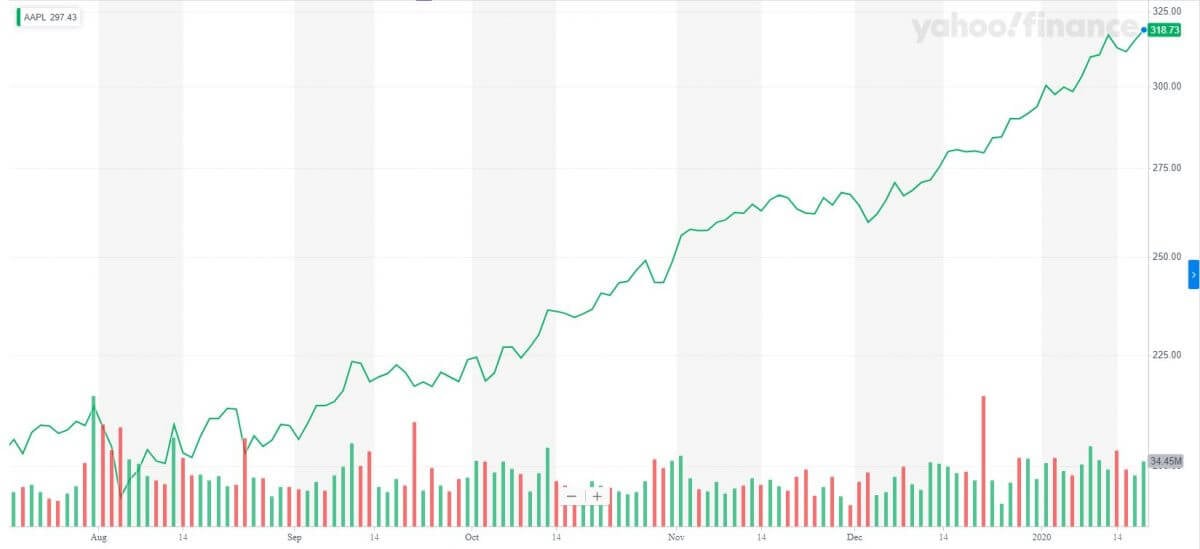$1.4 Trillion Apple Is About To Dwarf The Entire Australian Stock Market

Apple is so freakishly huge that it's almost on par with the stock market of one of the world's wealthiest countries. | Image: REUTERS / David Gray / File Photo
- Apple is nearly worth more than the entire stock market of one of the world’s wealthiest countries, Australia.
- AAPL’s incredible run puts it’s valuation on the brink of $1.4 trillion which is where the Aussie ASX currently sits at record highs.
- Despite U.S. economic dominance it’s hard not to be a little unnerved by Apple’s bubbly valuation.
In an extraordinary example of the staggering performance of the U.S. tech sector, Apple (NASDAQ:AAPL) is now worth almost $1.4 trillion. To put this extraordinarily large figure in context, this puts the iPhone maker on track to be worth more than the entire market cap of the Australian stock market (ASX) very soon.
Apple Is Nearly Worth As Much As Australia’s Entire Stock Market

When trying to grasp just how exorbitant Apple’s $1.39 trillion valuation is, it’s vital to bear in mind just how wealthy Australia is. Currently ranked no.14 in the world based on annual GDP, Australia is second only to Switzerland in wealth per adult citizen (ahead of the United States).
Blessed with vast natural resources, Australian mineral exports have made China’s rapid expansion possible, mostly thanks to their abundance of iron ore. The region of Western Australia is the largest iron ore producer and exporter in the world .
At the same time, Southern Australia’s big cities of Sydney, Melbourne and Adelaide have vibrant service-based economies. Sydney has some of the most expensive real estate in the world, with some homes selling in excess of $100 million .
When you consider all this, it’s mind-blowing to think that Apple’s market cap could soon be more substantial than Australia’s stock market. It’s not like Aussie stocks aren’t doing incredibly well lately, despite the horrific bush fires.
https://www.youtube.com/watch?v=WX0vI08Gp5c
ASX Lacks Global Brands
Of course, there’s an explanation. Before we look at the fundamentals behind AAPL’s moon-trip, let’s take a look at three of the largest publicly traded Aussie stocks ; Wesfarmers Limited, Woolworths Group Limited and Telstra Corporation.
If you aren’t from Australia, you’ve probably never heard of these companies (our U.K. readers might know the Woolworths’ name, but there is no affiliation with the collapsed British retail company.)
This is the biggest difference between the U.S. stock market and its Australian cousin. There are few truly global brands.
U.S. Has Three $1 Trillion Tech Giants
America’s big-tech companies – Apple, Microsoft and Google-parent Alphabet – all have more than $1 trillion valuations . Throw Jeff Bezos’ Amazon into the mix, and you have nearly $4 trillion among just four companies on the U.S. west coast alone.
America’s ability to create groundbreaking tech and captivating global brands are, of course, not the only explanation. While much of the world has struggled with moderate growth since the great recession, capital has continued to pour into the U.S. That’s because its relative economic out-performance and military might make it a dream place to park money.
AAPL Stock Can’t Help But Look Bubbly

Focusing directly on Apple, Steve Job’s funky alternative to Microsoft has been going from strength to strength of late. With strong sales in China and for its Airpod wireless headphones, investors can’t get enough AAPL.
Apple has also implemented a colossal stock buyback program during a period of relentless liquidity injections from the Federal Reserve. With nowhere else to go for yield, risk-taking has hit new heights as interest rates flat-line and global investors desperately seek returns in a historically low interest-rate environment.
When you tie it all together, the fact that Apple’s market cap is roughly the same as the entire stock market of one of the world’s wealthiest nations is both wholly reasonable and terrifying in equal measure.